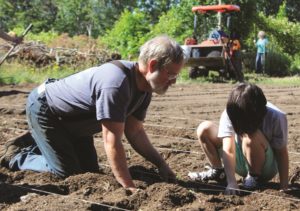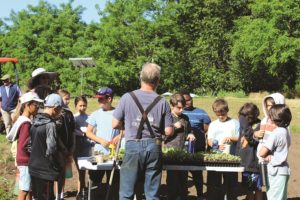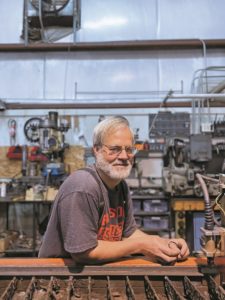EASTHAM — The fourth-grade students from Mrs. Howard’s class at Eastham Elementary School marched across the street to Redberry Farm on the morning of June 21. There, they met farmer Bob Wells to plant Eastham turnips — as the town’s fourth-graders have done for the last five years.
This tradition is one of many ways Wells shares his land. “The way I look at this piece of ground out here is that it was a gift from God, literally handed to me,” said Wells of his five-acre plot. “I don’t even think of it as being mine. I think, ‘How can I use this to benefit the most people?’ ”

Students gathered early on that Tuesday morning in the future turnip field and listened as Wells explained the task at hand. Five straight rows were established by taut lines of string, staked at each end to provide a visual guide for planting. In pairs, the children dug 10 holes each, spaced 18 inches apart along the lines. Some students used trowels and others their hands as they settled their seedlings into holes that strayed only a little here and there from the straight lines.
“Try to think like a plant,” Wells said to the students as they removed rocks and sticks from the soil. “What sort of conditions would you want to grow in?”
To introduce experimentation and to improve those conditions, students added handfuls of biochar, a charcoal-like soil amendment made onsite by Wells, to the first five holes of every row. Wells explained that biochar, made from burning biomass, both restores carbon and offers adsorptive properties that better store microorganisms and beneficial nutrients in the soil.
A few rows over, another collaboration is underway. This season, Wells is renting fields to James Rosato and Laura Howes of Dirt Farm Co. Rosato and Howes have farmed on a 3,500-square-foot plot at Putnam Farm in Orleans for the past three years, but they are beginning to outgrow it.
“There are a lot of young people who would love to grow their farm and don’t have space to do it,” Wells said. “If I am too busy with biochar and I’m not planting that field, there’s somebody else that can use it.”
Howes and Rosato, both residents of Orleans, are grateful for the chance to expand to Wells’s

land. “It is so hard to find land on Cape Cod,” said Howes.
On roughly one acre at Redberry Farm, Dirt Farm Co. is growing a range of root crops this season, including, of course, the Eastham turnip. Farmers Jared Kimler and Brian Tingley grew Eastham turnips on Wells’s land last year, working it as Howes and Rosato are now.
“If we are going to have a local food system,” Rosato said, “community space is the solution.”
The Wellses purchased the land, which lies adjacent to their Eastham house, in 2005. It was densely overrun with brambles, vines, and multiflora rose — a seemingly unlikely place for a farm.
Bob Wells, however, had a vision. “I always have too much vision,” he said. “I thought, ‘I’m gonna grow stuff out there.’ ”
After months of stump-pulling and brush-clearing, a plot of blueberries was planted. “It very quickly became obvious that the soil here is terrible,” said Wells. “And that I was a complete fool to base my life on growing things in it.”
But he didn’t give up. Instead, he began collecting organic matter, including fertilizer-free grass clippings, oak leaves, dead fish and lobster, and food waste, to establish compost piles. The Eastham Transfer Station proved a valuable source of material early on. Gradually, Wells developed other “symbiotic relationships” with people who supply him with nutrient-dense materials that, once composted, enrich the sandy soil. By sourcing organic matter only from the surrounding area, the quality of the soil is improved both sustainably and economically.
Meanwhile, Wells continued his research into what makes for healthy soils. “Whenever I take on a task,” Wells said, “I buy a lot of books and study it as in-depth as I can. It’s always fun learning something new.”
He read about the origins of biochar and how creating and using it originated in the Amazon basin. There, indigenous peoples created a rich, black soil known as terra preta by adding charcoal to the earth.

Wells designed and built a small retort — imagine a low-oxygen kiln — to create this biochar and brought it to friends at the Orleans Farmers’ Market, where, at the time, he sold his crops each Saturday. Farmers asked for more, and soon he found himself teaching others how to make it and designing more and larger retorts.
Wells said that he never expected to create a biochar industry on Cape Cod. But he founded New England Biochar in 2009. The company, run by Wells with one partner, Ryan Sverid of Eastham, has shipped biochar-making machines nationwide and even overseas. Working from Wells’s workshop on Holmes Road in Eastham, he and Sverid design and construct nearly every component of each system from scratch.
Though the business has grown, Wells says that he is not motivated by money. “I’m just not that way,” he said. “I really look at what I do from the standpoint of helping the world. I want to do what’s best for everybody, not just me.”
For Wells, this means educating and enabling others to create and use biochar where they live. “The machines, we ship globally,” said Wells. “But it’s the opposite with the biochar itself,” which he sells only close to home.
“My philosophy has always been, especially if you’re talking about carbon footprint, that you don’t make something in your back yard and ship it to New Jersey, much less Taiwan,” he said. “You make it here and use it here.”
Come fall, the fourth-grade class will return to the rows they planted to dig the Eastham turnips and to check on the difference in growth patterns between plants that got biochar and plants that didn’t. Wells and his wife, Connie, will help students weigh and record the harvest — so there will be a lesson in data collection, too.
“Everything goes into it,” Wells said of the students’ project. “History, science, botany, biology, math.” The kids, he adds, have a lot of fun doing it, “and I have a lot of fun doing it with them.”



